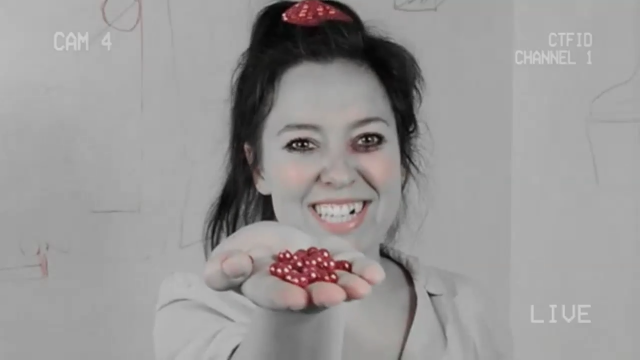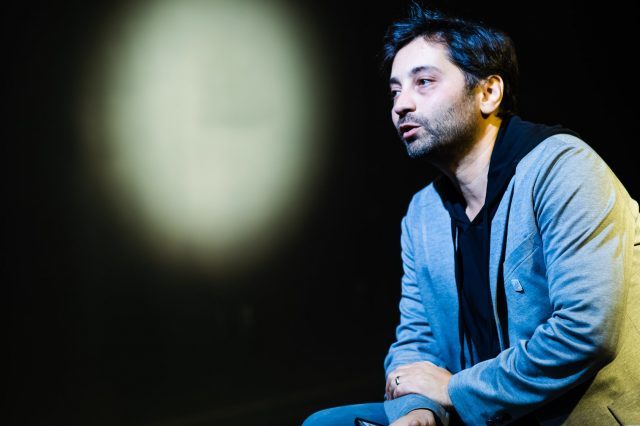
Darya Denisova gives a bold performance made for Zoom in State vs. Natasha Banina
STATE VS. NATASHA BANINA
Baryshnikov Arts Center online
Cherry Orchard Festival
Monday, October 12, and Wednesday, October 14, free with RSVP, 8:00
bacnyc.org
www.arlekinplayers.com
In my June 21 review of State vs. Natasha Banina, I wrote that “the future of online productions might be best represented so far by Arlekin Players Theatre’s State vs. Natasha Banina.” Part of the Cherry Orchard Festival, the forty-five-minute solo play is an online adaptation of the Boston troupe’s version of Yaroslava Pulinovich’s Natasha’s Dream, which deals with mental illness and, perhaps, murder. The extraordinary interactive work — the audience serves as a jury — is directed by company founding artistic director Igor Golyak and stars his partner, Darya Denisova, who is brave and mesmerizing as Natasha. What began as a handful of live performances has blossomed into a virtual national tour, with Arlekin teaming with arts organizations around the country to put on the play, complete with an integral talk afterward in which Golyak and Denisova are likely to reveal some of their theatrical secrets.
Among the play’s countless fans is Mikhail Baryshnikov, who is bringing the production to the Baryshnikov Arts Center (online, not in person) on October 12 and 14 at 8:00; tickets are free with advance RSVP. The October 12 show will be followed by a talkback with music critic and Beginner’s Ear founder Corinna da Fonseca-Wollheim, while the October 14 postshow discussion will feature actress Jessica Hecht, who is planning on working with the troupe soon. As they prepare for the BAC shows, Golyak, who runs the Igor Golyak Acting Studio, and Denisova, who teaches there, answered some questions about their sudden success and the future of theater.
twi-ny: For those previously unfamiliar with your company, you have staged innovative adaptations of The Seagull, Dead Man’s Diary, and The Stone, among others, that create unique relationships between audience and performer. When you were looking for a play to take online, what was it about Natasha that made you think it was ripe for virtual reimagining?
igor golyak: First of all, the subject matter of systems failing young people felt really relevant today, so the theme was definitely an inspiration. This is generally how we approach text at Arlekin; I want to have a discussion with the audience about subject matter, not a lesson plan, but pose a question around a point of pain in me and the collaborators.
twi-ny: Natasha has become a viral sensation, one of the most-talked-about and widely praised online productions during the pandemic. What has that experience been like?
ig: The experience has been overwhelming. Being an immigrant theater with our accent not just in language but in the approach to the theater, we feel understood.
twi-ny: Darya, during the show, you call out some of the names of the people watching, but you can’t see them over Zoom. What’s it like giving such an intimate, courageous performance without a visible audience?
darya denisova: Actually, there is a seventy-inch monitor right in front of me, so I do see the audience at certain points. It is very inspiring when audience members choose to keep their videos on; I get to see their facial expressions, their emotions, and how people change during the course of the performance. This makes the connection between me and the audience very real.
twi-ny: One of your fans is Mikhail Baryshnikov, and on October 12 and 14, you will be performing the show for the Baryshnikov Arts Center. You have been able to essentially tour the show online, creating a new model, collaborating with organizations across the world. How did that come about?
ig: We work with two amazing touring producers, Sara Stackhouse of BroadBand and Maria Shclover and Irina Shabshis of the Cherry Orchard Festival Foundation, who have strategized around how the show lives and where it is presented next. It is an incredible feeling being able to present the show in different languages with subtitles live to an audience across the globe. We are not only touring with theaters but also with film festivals, which opened a new door to virtual theater. We don’t know where this is going and what’s next, as this has not really existed before, but we are eager to find out.
twi-ny: Do you find audience reaction different depending on which organization you are partnering with? Do the reactions change with the geographic location of the organization?
ig: Great question; yes it does! We have had only one not guilty verdict with an all-immigrant audience. However, I will say that all our audience members are sophisticated theatergoers, and the discussions that take place postshow are extremely thoughtful and lively.
dd: The audience reactions are different at every show, and so is the connection. I don’t think geographic locations matter — Natasha’s story is universal; it could happen anywhere.
twi-ny: You mentioned different languages. The play is sometimes performed in Russian. Does it feel different compared to when you do it in English?
ig: Yes, the play in Russian feels a little more authentic; being artists from that part of the world, we really know the character. The character, not the language, is sometimes difficult to translate. I can’t generalize, but in Russia, people view for example drunks or alcoholics as having a difficult life and feel more pity for them maybe because they can relate. In America, I feel it is more black and white. So I guess what I am saying, Dostoyevsky couldn’t have written Crime and Punishment here in the US. I don’t know if it is good or bad, probably good, but these are just my subjective observations. By the way, these are the questions that an immigrant from Russia grapples with their whole life.

Director Igor Golyak, seen here at Arlekin’s tenth anniversary celebration last year, is reinventing online theater with State vs. Natasha Banina
twi-ny: What has the success of Natasha meant for Arlekin? At a talkback that I attended, you noted that on the other side of this, you were going to continue exploring technical innovation over the internet in addition to in-person productions. What do you see as the future of the company, especially now that you have a global fan base that goes far beyond your fifty-seat theater in Boston?
ig: Glad you asked. In addition to our in-person live theater, we will be announcing the creation of a virtual theater stage with its own season in the coming days. Stay tuned for a press release.
twi-ny: That’s exciting. When you’re not at home, what do you like to do? Have you gone out much during the pandemic?
dd: I teach acting privately, and I really love what I do. Having a toddler and a dog keeps me outdoors most of the time, which I love.
twi-ny: Igor, do you go out much?
ig: Not enough. It is getting to me. I just came from a meeting at a coffee house and realized that people are not two-dimensional. Revelatory!